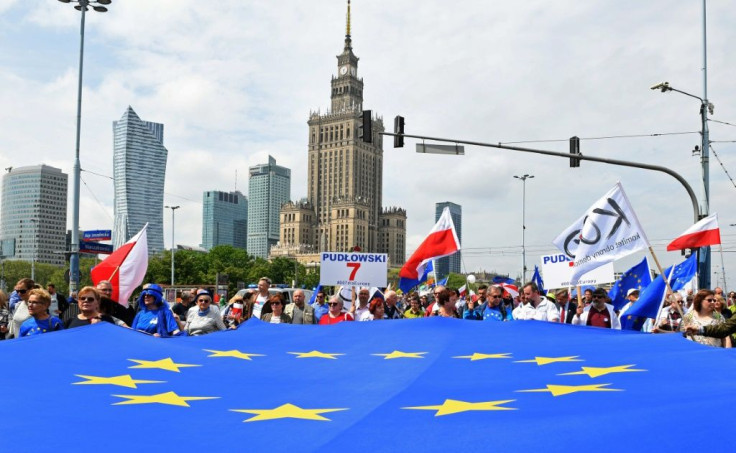Is Brexit And Strong Local Economy Driving Polish Immigrants Back Home?

KEY POINTS
- After Poland entered EU in 2004, waves of young people departed the country
- By 2018, 2.5 million Poles lived abroad
- Poland now suffers from aging demographics and labor shortage
Polish immigrants in the United Kingdom are now considering moving back home to a country with a booming economy while Britain looks to quit the European Union.
After Poland joined the EU in 2004, waves of young people migrated to other countries, including the U.K. By 2018, some 2.5 million Poles were living and working abroad.
“I’ve spent many years in Britain, and I consider this my home. It is heartbreaking for me, because my family has connections here -- we all have friends,” said Mateusz, who has lived in the U.K. for 15 years. “It’s very difficult, but you have to make a decision.”
Indeed, Statistics Poland said some 85,000 Poles returned home last year – reportedly the vast majority of these returnees left the U.K.
The Warsaw government is eager to lure more emigres back, particularly to alleviate a labor shortage. Poland’s population is projected to drop by 12% by 2050.
In fact, the labor shortage is so pronounced in Poland, some companies are actually using robots.
For example, the Amica washing machine warehouse near Wronki in western Poland uses only one person and several huge robots.
“The lack of workers is one of the main problems in Poland today,” said Marcin Bilik, Amica’s chief operating officer. “Nobody can find people to work and every year we lose about 100 [to retirement]. In [the] future, there will be fewer Poles in our production, not more. This is our future. So we have to think about new technologies, and how to change our factory to use fewer people.”
Bilik said his company will spend 250 million zlotys ($65 million) on automation in the next five years.
However, Jakub Krupa, a board member at the Polish Social and Cultural Association, the U.K.’s largest Polish community center, said although Brexit has prompted some Poles to leave Britain, he insisted personal factors are more determinant.
“[Polish] people realize that they’ve achieved what they wanted in the U.K., be it saved some money for buying or building a property in Poland, or developing their career a bit, or starting a family,” he said. “They’re saying, ‘I’ve reached the stage where I’ve been here for years now and maybe it's time to move back to Poland, closer to parents or other family members.’”
Karol Skrzyszowski left London in 2016 and now works at a bank in Krakow. He returned to Poland because of good jobs and the low cost of living.
“I was thinking about either settling down in London or moving back. And one of the main reasons was that when I saved up enough money for a flat in London, I realized that could easily buy me a nice flat in Krakow,” he said.
Some 900,000 Poles remain in the U.K. Assuming most of them stay there, the Polish government has encouraged other immigrants to fill its labor shortage. Last year, Poland issued 635,000 residence permits to foreign workers – mostly Ukrainians -- more than any other EU country.
About 1.3 million Ukrainians currently work in Poland, the Gazeta Wyborcza newspaper reported.
However, given Poland’s hostility to non-European immigration, it is unlikely it will seek to attract large numbers of migrants from Asia or Africa.
For example, of the 232,000 work permits issued by Poland in the first half of this year, only about 23,000 were given to citizens of 10 Asian nations: Nepal, India, Bangladesh, Philippines, Vietnam, China, South Korea, Indonesia, Sri Lanka, and Pakistan.
It’s unclear exactly how Poland will deal with a worker shortage and an aging population.
“The rate of aging [of the workforce] will be the fastest in the EU in the next three or four decades so, given the rate of decline in the labor supply, it’s very important to look at all potential reservoirs of labor,” said Iga Magda, vice president of the management board at the Institute for Structural Research in Warsaw.
Some Poles in the U.K. might be thinking about moving to Germany -- there are actually more Polish workers now in Germany than the U.K.
An advertisement posted by the University Hospital of Düsseldorf seeking to attract Polish nurses in the U.K. to Germany stated: "Not only do we have better pay, better social benefits and better working hours, we also have better weather, better food and a shorter way to Poland -- and the security of an EU state."
Kamil Wolczyk, the manager of Polish recruitment for Germany at the Work Service recruitment agency, said the German market was always one of the most desirable destinations for Polish workers.
"We have to remember that the German market was opened for Polish workers long after Poland joined the EU and the German language was always a big barrier between Polish workers and German employees," he said.
But now Germany has relaxed language requirements for some foreign workers.
"Polish workers have much more possibilities, with their English skills, to work in Germany," he added.
Poles now comprise Germany’s second largest foreign community, behind only Turks.
© Copyright IBTimes 2025. All rights reserved.





















